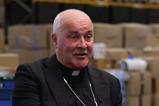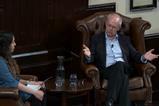The House of Bishops appears to have reversed direction in the Church of England’s long-standing debate about sexuality and marriage. Dr Ian Paul says following proper procedure is the least bishops can do - and should cause hard questions to be asked about what has already happened

Last week, the House of Bishops of the Church of England released a statement which appears to be a reverse of direction in the Church’s long-standing and acrimonious debate about sexuality and marriage.
The statement looks unexciting at first: any further changes to teaching and practice around marriage will need to follow due process. And all the papers setting out the theological and legal position will be published in full.
This might, from the outside, seem unremarkable. But to understand its significance, we need to track back a little.
How we got here
The Church’s teaching on marriage has been clear and consistent: that marriage is “according to the teaching of our Lord”, a lifelong and exclusive union (Canon B30).
Ten years ago, the Church of England’s governing body, General Synod, embarked on ‘shared conversations’, which were designed to get those who disagreed to understand each other better. Those at the top appeared to think that this would solve our problem - that the heart of the matter was just misunderstanding. It turned out not to be so!
At the end of the process, in February 2017, the House of Bishops brought a paper to Synod, in effect saying that while the conversations had been helpful, there was no reason to consider changing the Church’s historic understanding of marriage as between one man and one woman.
But by a narrow margin, Synod voted not to ‘take note’ of this paper, signalling that not everyone was happy with the recommendation to uphold the status quo. Most Rev Justin Welby, then Archbishop of Canterbury uttered a fateful phrase: “We need a radical new Christian inclusion, rooted in scripture and Christian tradition.”
We have long suspected the bishops have been ignoring legal advice - or at least playing it down
Liberals seized on this - though ignoring the “rooted in scripture” part. And it became the launch point for the ‘Living in Love and Faith’ process (LLF). This was initially intended to be a teaching document from the bishops, but it quickly morphed into another series of battle grounds on the ideas connected with sexuality, identity, and marriage. By the end of the process, all parishes were supposed to have engaged with LLF, but there was little enthusiasm - and patchy engagement.
The process was seriously hampered by Covid, and then by the death of Queen Elizabeth II in 2022. The bishops brought rushed proposals to Synod in February 2023, and every following session of Synod became an LLF battleground.
It remained clear that the doctrine of marriage was not going to change. This was partly because of issues of process; a serious change like this would need a two-thirds majority in each house of laity, clergy, and bishops - the kind of protection against a split down the middle that we needed in our referendum on the EU. And that was never going to happen.There were not enough people who wanted change. But it was also because, in the Church’s canon law, not only is the doctrine of marriage clear, but our source of doctrine - scripture, as mediated to us by the Book of Common Prayer and the 39 Articles - is also clear. If the first changed, then the second would have to as well, and that would redefine the Church of England.
A gradual erosion
Two main questions remained: was there any formal way in which relationships of gay couples could be recognised, or at least the goods in their relationship acknowledged, without formally changing the doctrine of marriage? And could clergy ever themselves be in a same-sex marriage while the doctrine remained as it was?
For some bishops, this was merely seeking a reasonable compromise, a ‘via media’ between what by now were two very polarised positions. But those who were clear that the doctrine of marriage should not be compromised, smelled a rat. This looked very much like salami slicing - gradually eroding the teaching of the Church (and so the teaching of Jesus) - changing facts on the ground until, at some future date, there would be a two-thirds majority for change.
There were good grounds for this assumption. Many liberals, including some bishops, spoke explicitly about any change being a step along a journey towards the “full acceptance” of gay people.
If change was only ever going to come about by avoiding due process, how could that be the will of God?
The bishops put before Synod ‘Prayers of Love and Faith’ (PLF), which could be used as a blessing for two people in a same-sex relationship, but which (it was claimed) was not a recognition of that relationship and so did not compromise the doctrine of marriage. And they ‘commended’ these, rather than bringing them through a proper process of approval, claiming that they were really not offering anything new.
The bishops also refused to be open about their process of discussion and refused to publish the legal and theological advice they had been given - although there were clues in the paperwork that all was not well. As a result, PLF barely scraped through Synod, the voting being almost exactly split 50-50. More significantly, there was a serious loss of trust in the House of Bishops, and a group of twelve bishops issued a dissenting statement; others challenged the process in Synod itself.
In the meantime, several key liberal bishops retired and, at the end of last year, Welby (who had been a driving force for change) resigned because of his failure to act in the John Smyth case. This has opened the way for the House of Bishops to take a new direction.
New hope
In their statement last week, the bishops agreed that any further changes would need to follow due process, that their own deliberations would be made public, and that the papers they received on theology, and the legal position of the Church would be published.
For those wanting to uphold the Church’s teaching on marriage, this has come as a breath of fresh air. It is what we have been asking for all along. We have long suspected the bishops have been ignoring advice - or at least playing it down.
To those who want to see the doctrine of marriage changed, this has come as a deadly blow and a deep discouragement; it looks like the end of the process. But the question remains: if change was only ever going to come about by avoiding due process - and by secret exercise of power behind closed doors - how could that be either good for the Church, or the will of God? And why had liberal bishops promised change that they knew, on the basis of advice they had been given, could never happen?
When the full papers are published, perhaps in the next month, further questions must be asked. Does PLF, as previously commended by the bishops, stand up to scrutiny? Does there need to be a rethink?
There has also been anxiety that the future direction of the Church on this matter was a done deal - and those appointed to senior positions would either want change or accept that it was inevitable. All that has now changed, and it will have an immediate impact on future appointments.
This holds out the real possibility that, if we want it, we can at last move on from the endless internecine warfare on sexuality - and focus on the central task of proclaiming the good news of Jesus, and seeing people grow as his disciples.





































4 Readers' comments